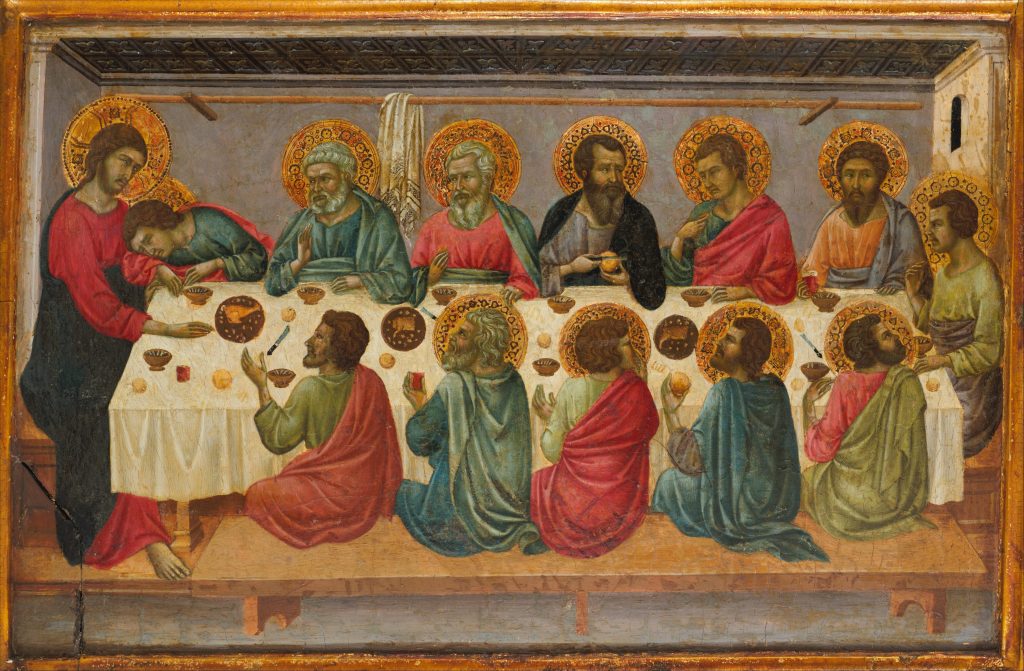The U.S. bishops are encouraging Catholics to deepen their love for the Eucharist as part of the ongoing National Eucharistic Revival initiative. In light of that effort, the following is the third in a series from Angelus contributing editor Mike Aquilina on the meaning and makeup of the Eucharistic Prayers.
Memory is the weak English word we use to translate the Hebrew “zikkaron.”
But it’s not just a problem in English. Scholars say that the original has never been translated well — not even in the Greek of the New Testament! And so it takes effort for us even to begin to understand what Jesus meant when he said, “Do this in memory of me” (Luke 22:19; 1 Corinthians 11:24).
It’s a line he said at his Last Supper, as he instituted the Eucharist, and the Church repeats it at the crucial moment at every Mass: the moment of consecration.
What does “memory” mean here?
For us, memory is a psychological act. It’s the faculty the mind uses to keep and retrieve information. When we hear the word in sentimental pop music, it usually means nostalgia for a “then” that is irretrievably past.
But none of these brings us close to the Hebrew “zikkaron.”
“Zikkaron” is a term associated with sacrifice — the offering of the flesh and blood of animals. By the act of sacrifice, the person who made the offering entered into remembrance before God.
Now, it’s not as if God ever forgets. God is all-knowing and eternal, and so all of time is present for him.
Zikkaron expresses the way that biblical religion empowered Israel to share in God’s experience of the events of sacred history — the Exodus, the wandering in the desert, the giving of the Law. The sacrificial liturgy did not merely call those events to mind. It reactualized them.
Thus, the people of Israel celebrated the Passover not as a past event, but as a reality of the present time. They participated in the Exodus. They became part of the drama.
When Jews celebrated Passover, they were not merely commemorating a long-ago liberation, the way Americans might keep the Fourth of July. As the ancient rabbis said in the “Mishnah,” “In every generation a man must so regard himself as if he came forth himself out of Egypt.” The ritual meal of the Passover, the “seder,” brought about a “real presence” of the past deliverance from Egypt. It was a symbol, a sign — but it accomplished, with divine power, the event that it signified. More than a millennium after Moses, every Jewish family experienced deliverance and liberation through the power of the Passover.
Of the Passover “seder,” the modern Jewish scholar Yosef Yerushalmi observed, “whatever memories were unleashed by the commemorative rituals and liturgies were surely not a matter of intellection, but of evocation and identification. ... Both the language and the gesture are geared to spur, not so much a leap of memory as a fusion of past and present. Memory here is no longer recollection, which still preserves a sense of distance, but reactualization.”
The people who shared in the “seder” were truly delivered from slavery. They were truly redeemed. “Memory” is a weak word for what they experienced.
Perhaps it’s because “zikkaron” is a distinctively Hebrew, uniquely biblical concept.
Yet it seems to express exactly what Jesus meant as he established the sacrament.
St. Pope John Paul II spoke at length of this at a General Audience in October 2000. He said the eucharistic memorial was “a biblical theme of primary importance.” And he cited the Catechism of the Catholic Church as his witness: “In the sense of Sacred Scripture the memorial is not merely the recollection of past events but the proclamation of the mighty works wrought by God for men. In the liturgical celebration of these events, they become in a certain way present and real.”
And so we speak of a “Real Presence” that commences from the moment we “do this in memory” of Jesus, just as he commanded.
“To remember,” said Pope John Paul, means “ ‘to bring back to the heart’ in memory and affection, but it is also to celebrate a presence.”
In every Mass, then, the remembrance is a true participation — and the present reality is also real and substantial. And yet there is more.
In every liturgical memorial, there is also a future dimension, an anticipation of greater fulfillment to come. That was true of the Jewish Passover, which pointed forward to the coming of the Messiah and the restoration of Jerusalem. But it’s true as well of the Mass.
In the prayers he wrote for the feast of Corpus Christi, St. Thomas Aquinas called the Mass the “Sacred Banquet … in which Christ is received, the memory of his passion recalled, the soul filled with grace, and the pledge of future glory given to us.”
And just as the participation in the past is real, so is the anticipation of the future. The Mass brings heaven to earth, actually and sacramentally.
Thus, past, present, and future — the span of sacred history — converge when we receive holy Communion. We truly participate in events of long ago. We truly anticipate the glories of the future. Yet we never leave the present moment.
That’s a lot to take in, and it’s a lot to remember — especially if “memory” is the best word we have to say it with.

